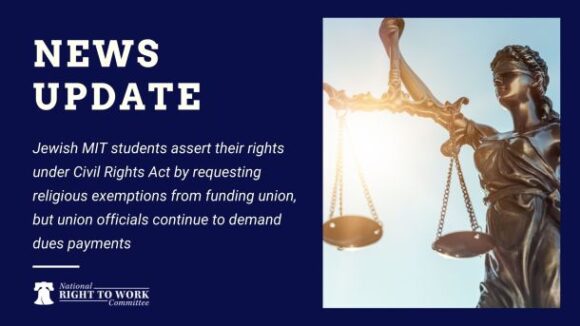‘People Have a Right to Make Their Own Choice’
Avelo employee Kim Howard believes all the firm’s flight attendants should get to vote on continued AFA rule. Credit: WTNH-TV (ABC,…
From the Richmond Times by NRTW President Mark Mix:
Weathering an economic downturn is never easy, but some states are managing better than others.
Despite the recession, Virginia boasts a modest unemployment rate, and its average hourly wages top the national mean. What’s the Old Dominion’s secret? One factor that sets Virginia apart from its less fortunate neighbors is the state’s popular Right to Work law.
Virginia’s Right to Work law ensures that no employee can be forced to join or pay dues to a union just to get or keep a job. Protecting employee choice has always been the most important argument in favor of Right to Work, but Virginia’s economic performance is another point for worker freedom.
Recent studies from the Cato Institute and the National Institute for Labor Relations Research indicate that right-to-work states enjoy higher job growth and more disposable income (after adjusting for families’ cost-of-living) than their forced-unionism counterparts.
Eight of the top 11 states for wage and salary growth enjoy right-to-work protections. Meanwhile, 13 of the 14 worst performers lack right-to-work laws.
Workers and their families are also voting with their feet: According to the National Institute for Labor Relations Research, the young adult population in forced-unionism states has basically stagnated since 1980. Virginia, on the other hand, continues to attract a stream of new workers and entrepreneurs.
Protecting worker freedom also prepares states to handle a difficult recession better than their forced-unionism counterparts.
Virginia’s robust job and wage growth compares favorably with the sluggish performance of union-dominated states like Michigan, Illinois and Wisconsin.
Not only that, but Virginia has been mercifully free from the type of political disruption plaguing forced-unionism states that try to tighten their belts by curbing the excesses of monopoly unionism.
Wisconsin and Ohio legislators endured disruptive protests and vicious, union-backed political campaigns because they had the temerity to challenge Big Labor’s public-sector stranglehold, an arrangement that drives up the cost of government while handing taxpayers the bill.
In states without public sector right-to-work protections, union bosses often funnel nonunion workers’ forced dues into coordinated political campaigns to protect and expand their special privileges.
As a result, every attempt to rein in government spending is met with fierce opposition from government union operatives, who will do almost anything to defend their forced-dues revenue stream.
The “Battle of Madison” in Wisconsin may have grabbed national headlines, but Richmond managed to avoid a similar showdown.
Virginia legislators were free to adjust their budgets to difficult and rapidly-changing economic conditions without the threat of massive, forced-dues-funded union politicking hanging over their heads.
Protecting worker freedom will always be at the core of Virginia’s longstanding Right to Work law. But in the midst of the worst recession in recent memory, the tangible economic benefits of Right to Work are worth appreciating, too.

Avelo employee Kim Howard believes all the firm’s flight attendants should get to vote on continued AFA rule. Credit: WTNH-TV (ABC,…

California’s Big Labor-concocted A.B.5, signed into law by Gov. Gavin Newsom in 2019, made it almost impossible for workers and firms to bounce back after 2020’s COVID-19 lockdowns. Now Biden bureaucrats want to federalize A.B.5!

Jewish MIT students assert their rights under Civil Rights Act by requesting religious exemptions from funding union, but union officials continue to demand dues payments